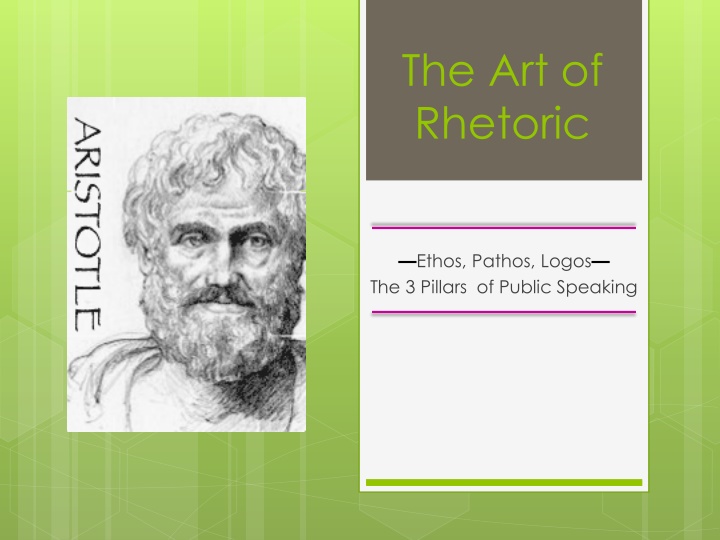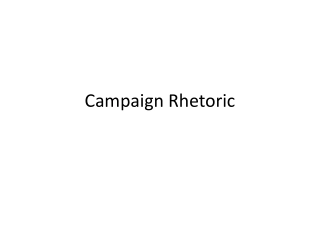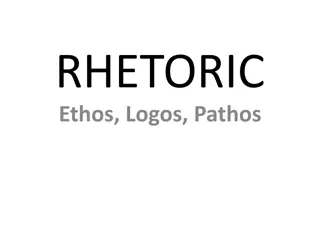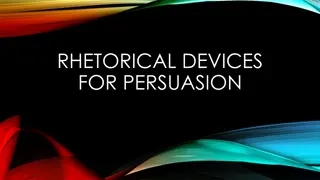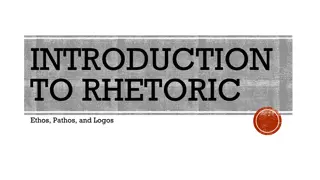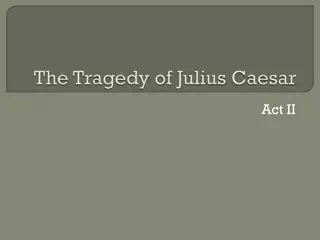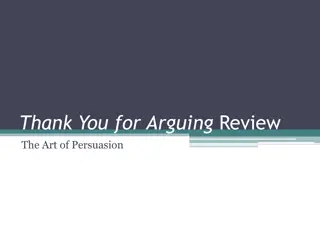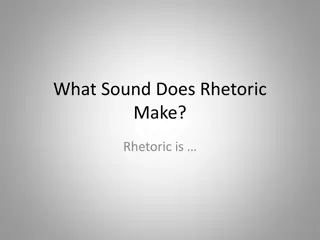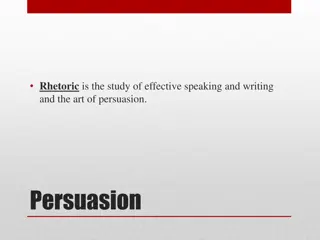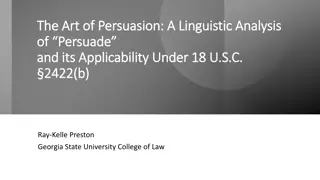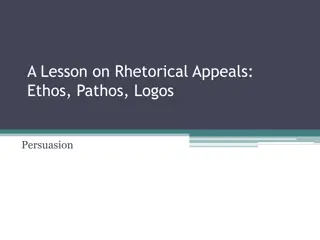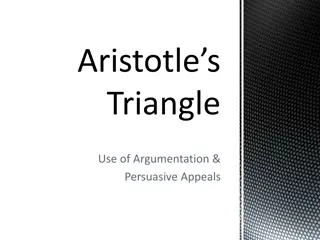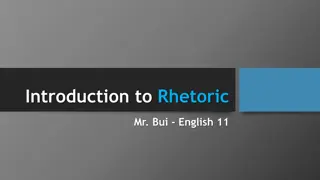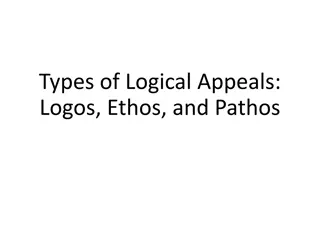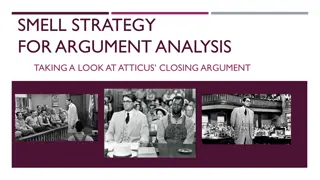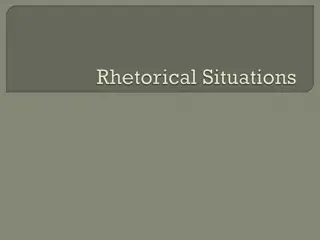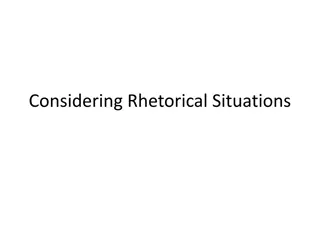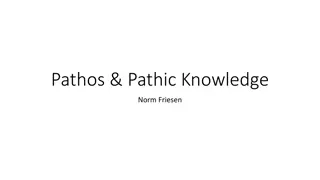Unveiling the Art of Rhetoric: Ethos, Pathos, Logos - Aristotle's Three Pillars of Persuasion
Aristotle's timeless principles of Ethos, Pathos, and Logos serve as the foundation for effective public speaking. Ethos focuses on credibility and character, Pathos on emotional appeal, and Logos on logical reasoning. Mastering these pillars can enhance a speaker's persuasiveness and connection with the audience.
Download Presentation

Please find below an Image/Link to download the presentation.
The content on the website is provided AS IS for your information and personal use only. It may not be sold, licensed, or shared on other websites without obtaining consent from the author.If you encounter any issues during the download, it is possible that the publisher has removed the file from their server.
You are allowed to download the files provided on this website for personal or commercial use, subject to the condition that they are used lawfully. All files are the property of their respective owners.
The content on the website is provided AS IS for your information and personal use only. It may not be sold, licensed, or shared on other websites without obtaining consent from the author.
E N D
Presentation Transcript
The Art of Rhetoric Ethos, Pathos, Logos The 3 Pillars of Public Speaking
Ethos, Pathos, Legos 2300 Years Ago . . . Aristotle first believed that if a speaker included Logos the facts to persuade audiences, the speaker would need nothing else. But, as a philosopher Aristotle also felt that Logos was not more important than the other two pillars Ethos and Pathos. And, that Logos alone was not sufficient to appeal to audiences.
Ethos is . . . an ethical appeal or a means to convince an audience of the author s credibility or character. . . . a reference to Aristotle and his three artistic proofs.
Ethos is The Greek word for character, ethos can be developed by . . . choosing contextual words that are appropriate for the audience and topic. introducing your expertise using correct grammar and syntax choosing words that are appropriate for your audience being fair and unbiased
Ethos is . . . measured by four root characteristics and how each is perceived by the audience: Trustworthiness as perceived by the audience Similarity to the audience Authority relative to the audience Expertise related to the topic
Ethos is Trustworthiness The speaker s trustworthiness is enhanced if the audience believes he has a strong moral character that is measured by Honesty Generosity Benevolence
Ethos is Similarity to the Audience The speaker s audience is more receptive to persuasion if they can identify with the speaker in one or more ways. Like Trustworthiness this is independent of the topic. Adapt language, mannerisms, and tone Career or Affiliation Personality Socio-economic status
Ethos is Authority Authority is the relationship between the speaker and the audience. Every speaker has some authority, how much depends upon how you present yourself. Organizational CEO, manager, supervisor Political president, leader, board member Religious priest, nun, pastor Educational professor, principal, teacher Elder a speaker older than the general audience
Ethos is Reputation or Expertise Expertise is what the speaker knows about the topic. Reputation is what the audience knows the speaker knows about the topic. Of the four characteristics, reputation is the most connected to the presentation. Experience Skill Achievements or Recognition
Ethos is Unlike Pathos and Logos the speaker s Ethos is usually established before the presentation begins. But, Ethos can be increased or established just as easily during a presentation through the inclusion of personal details as it can before the presentation. Positive Ethos can give a speaker more leeway with the audience if they present badly, but poor Ethos and a poor speech together will usually lead to disaster.
Ethos Example "I will end this war in Iraq responsibly, and finish the fight against al Qaeda and the Taliban in Afghanistan. I will rebuild our military to meet future conflicts. But I will also renew the tough, direct diplomacy that can prevent Iran from obtaining nuclear weapons and curb Russian aggression. I will build new partnerships to defeat the threats of the 21st century: terrorism and nuclear proliferation; poverty and genocide; climate change and disease. And I will restore our moral standing, so that America is once again that last, best hope for all who are called to the cause of freedom, who long for lives of peace, and who yearn for a better future." Democratic Presidential Candidate Acceptance Speech Barack Obama August 28, 2008
Ethos Example I have pledged myself and my colleagues in the cabinet to a continuous encouragement of initiative, responsibility and energy in serving the public interest. Let every public servant know, whether his post is high or low, that a man's rank and reputation in this Administration will be determined by the size of the job he does, and not by the size of his staff, his office or his budget. Let it be clear that this Administration recognizes the value of dissent and daring -- that we greet healthy controversy as the hallmark of healthy change. Let the public service be a proud and lively career. And let every man and woman who works in any area of our national government, in any branch, at any level, be able to say with pride and with honor in future years: I served the United States Government in that hour of our nation's need. State of the Union Message John F. Kennedy January 30, 1961
Ethos Example If, in my low moments, in word, deed or attitude, through some error of temper, taste, or tone, I have caused anyone discomfort, created pain, or revived someone's fears, that was not my truest self. If there were occasions when my grape turned into a raisin and my joy bell lost its resonance, please forgive me. Charge it to my head and not to my heart. My head-- so limited in its finitude; my heart, which is boundless in its love for the human family. I am not a perfect servant. I am a public servant doing my best against the odds. Democratic National Convention Keynote Address Jesse Jackson 1984
Ethos Examples . . . in Media
Pathos is . . . an emotional appeal or a means to persuade the audience by appealing to their emotions. . . . the Greek word for both suffering and experience. The word pathetic is derived from pathos. As well as empathy, pathology, sympathy, and antipathy.
Pathos is Pathos is developed by using meaningful language, emotional tone, emotion evoking examples, stories of emotional events, and implied meanings to get the audience to feel what the author feels. Evokes sympathy from an audience Draws pity from the audience Inspires anger in order to prompt action
Pathos is Which emotions should a speaker bring to the audience s mind? Joy or sadness Trust or disgust Fear or anger Surprise or anticipation Optimism or disappointment Love or remorse Submission or contempt Awe or aggressiveness The answer is . . . all of them and every emotion in between.
Pathos is Will any emotion do? The answer is, no. The emotion must be appropriate for the context of the presented material and the audience. Positive emotions (joy, awe, surprise): Should be associated with the speaker s claims or side of the argument. Negative emotions (fear, contempt, anger): Should be associated with the opponent s claims or side of the argument.
Pathos is There is no one set of emotions to include to embrace all audiences. The goal of any speaker or writer is to: Be aware of the wide range of emotions Decide which emotions to arouse Learn how these emotions can be induced within the speaker s audience Can you think of any examples from media that would evoke Pathos?
Pathos is Pathos Examples Commercials: ASPCA Christian Children s Fund Hallmark Mastercard ( watching . . . Priceless! ) Literature: Cinderella stories Romeo and Juliet
Pathos Example I am not unmindful that some of you have come here out of great trials and tribulations. Some of you have come fresh from narrow jail cells. And some of you have come from areas where your quest -- quest for freedom left you battered by the storms of persecution and staggered by the winds of police brutality. You have been the veterans of creative suffering. Continue to work with the faith that unearned suffering is redemptive. Go back to Mississippi, go back to Alabama, go back to South Carolina, go back to Georgia, go back to Louisiana, go back to the slums and ghettos of our northern cities, knowing that somehow this situation can and will be changed. I Have A Dream Martin Luther King Jr. August 28, 1963
Pathos Example Kimberly N. had a senior position at a charitable organization when her son was born. She planned for a six-week maternity leave, but her son was born with a life- threatening condition, and she ended up taking 12 weeks with partial pay. Kimberly s supervisor was unhappy that she took such a long leave and refused to let her work part-time or from home. After going back to work, Kimberly had a terrible performance evaluation that contrasted sharply with her previous positive evaluations. She soon left her job, which significantly impacted family finances. Savings quickly dwindled, debts grew, and Kimberly filed for bankruptcy. A few months later, she found a part-time job at a lower level with no benefits but was laid off when the recession hit. She worries that future employers will question her period of unemployment. An Argument for Parental Leave in the United States Janet Walsch February 23, 2011
Pathos Example The Rangers looked up and saw the enemy soldiers -- at the edge of the cliffs shooting down at them with machine guns and throwing grenades. And the American Rangers began to climb. They shot rope ladders over the face of these cliffs and began to pull themselves up. When one Ranger fell, another would take his place. When one rope was cut, a Ranger would grab another and begin his climb again. They climbed, shot back, and held their footing. Soon, one by one, the Rangers pulled themselves over the top, and in seizing the firm land at the top of these cliffs, they began to seize back the continent of Europe. Two hundred and twenty-five came here. After two days of fighting, only 90 could still bear arms. Behind me is a memorial that symbolizes the Ranger daggers that were thrust into the top of these cliffs. And before me are the men who put them there. These are the boys of Pointe de Hoc. These are the men who took the cliffs. These are the champions who helped free a continent. These are the heroes who helped end a war. Gentlemen, I look at you and I think of the words of Stephen Spender's poem. You are men who in your "lives fought for life...and left the vivid air The Boys of Point Du Hoc Normandy France Ronald Reagan June 6, 1984
Pathos Examples . . . in Media
Logos is . . . an appeal to logic a means to convince an audience by use of logic or reason. . . . the words by which inward thought is expressed. The word logic is derived from logos.
Logos is In speaking Logos is often equated with logical reasoning or an argument based on reasoning. Is the message to the audience based on Facts Statistics Evidence
Logos is Or will your call-to-action lead to the desired outcome that you have promised? Through the use of reason you can move an audience toward action or inaction which one depends upon your proof.
Logos is Logos is developed by using advanced, theoretical or abstract language. Deductive Reasoning Inductive Reasoning
Logos is Deductive Reasoning . . . begins with one or more premises based on deductive arguments that lead to one conclusion that is true. Premises are: Facts Claims Evidence Proven conclusions
Logos is The key to Deductive Reasoning is that if your premises are true, then your conclusion(s) must also be true. A + B = C
Logos is Inductive Reasoning also begins with one or more premises based on deductive or logical arguments that lead to one conclusion but that conclusion may not be guaranteed to be true. So why is this important?
Logos is Deductive and Inductive reasoning are important because your audience continuously and subconsciously applies these two reasoning skills to draw a conclusion for themselves. That conclusion can wholly depend upon what you present and can include or compete with the audiences strong emotional experiences.
Logos is . . . For example You are presenting a new weight-loss diet to your audience. The new diet reduces hunger (premise A) Reducing hunger will reduce caloric intake (premise B) The new diet will cause weight loss (premise C)
Logos is Now. . . what is your audience thinking? Every diet I have tried has failed miserably (premise D) This new diet is similar to those failed diets (premise E) Therefore this new diet will also fail, miserably (premise F)
Logos is Deductive and Inductive Reasoning In this scenario your are competing with the audience s strong emotional experiences (pathos). Since your audience has to resolve these feelings of failure, it is up to you to provide an argument that shows this diet will be different than the others.
Logos is How is this accomplished? It is difficult for a speaker to compete against a lifetime of beliefs and premises that have been previously formed by individual audience members. So . . . The answer is to use commonplaces.
Logos is Commonplaces are . . . beliefs which represent shared wisdom and are widely held by groups of people. Family members Organizations Society in general
Logos . . . in Media Logos is also often used as a subliminal element to emulate or compete with facts that may not at first be apparent. Media accomplishes this task through . . . Using reverse imagery Using letters to form an image Using symbols to represent meaning
Logos Example However, although private final demand, output, and employment have indeed been growing for more than a year, the pace of that growth recently appears somewhat less vigorous than we expected. Notably, since stabilizing in mid- 2009, real household spending in the United States has grown in the range of 1 to 2 percent at annual rates, a relatively modest pace. Households' caution is understandable. Importantly, the painfully slow recovery in the labor market has restrained growth in labor income, raised uncertainty about job security and prospects, and damped confidence. Also, although consumer credit shows some signs of thawing, responses to our Senior Loan Officer Opinion Survey on Bank Lending Practices suggest that lending standards to households generally remain tight. The Economic Outlook and Monetary Policy Ben Bernanke August 27, 2010
Logos Example Two major studies from military intelligence experts have warned our leaders about the dangerous national security implications of the climate crisis, including the possibility of hundreds of millions of climate refugees destabilizing nations around the world. Just two days ago, 27 senior statesmen and retired military leaders warned of the national security threat from an energy tsunami that would be triggered by a loss of our access to foreign oil. Meanwhile, the war in Iraq continues, and now the war in Afghanistan appears to be getting worse. A Generational Challenge to Repower America Al Gore July 17, 2008
Logos Example Apple has come down from $363 in February to $316 Monday. Furthermore, that masks the fact that the company is sitting on a ton of net cash. At the end of the last quarter, cash, securities and other liquid assets exceeded liabilities by $51 billion, or around $55 a share. This may top $60 by the end of this quarter. So the cash-free stock price the enterprise value of the business may only be around $260. That s barely 10 times forecast earnings of $25 for the fiscal year ending in September. It s just nine times next year s forecast earnings. And it s only around 2.3 times this year s sales. Is Apple Becoming a Value Stock Brent Arrends July 17, 2008
Ethos, Pathos, Logos Although we have looked at Ethos, Pathos, and Logos used as separate elements, they rarely are independent of each other. Contrary to what has been presented as examples, the three bodies work together to persuade audiences to form opinions and/or move to action. Next is an example of how Ethos, Pathos, and Logos work together in George W. Bush s Presidential Nomination Acceptance Speech. Ethos elements are in blue Pathos elements are in brown Logos elements are in pink
Ethos, Pathos, Legos Ethos, Pathos, Logos Nomination Acceptance Address By George W. Bush August 18, 1988 My friends, eight years ago this economy was flat on its back -- intensive care. We came in and gave it emergency treatment: Got the temperature down by lowering regulation, got the blood pressure down when we lowered taxes. Pretty soon the patient was up, back on his feet, and stronger than ever. And now who do we hear knocking on the door but the doctors who made him sick. And they're telling us to put them in charge of the case again. My friends, they're lucky we don't hit them with a malpractice suit! We've created seventeen million new jobs in the past five years -- more than twice as many as Europe and Japan combined. And they're good jobs. The majority of them created in the past six years paid an average of more than $22,000 a year. Someone better take 'a message to Michael': Tell him we've been creating good jobs at good wages. The fact is, they talk -- we deliver. They promise -- we perform. There are millions of young Americans in their 20's who barely remember the days of gas lines and unemployment lines. Now they're marrying and starting careers. To those young people I say " You have the opportunity you deserve -- and I'm not going to let them take it away from you." There are millions of older Americans who were brutalized by inflation. We arrested it -- and we're not going to let it out on furlough. We're going to keep the social security trust fund sound, and out of reach of the big spenders. To America's elderly I say, "Once again you have the security that is your right -- and I'm not going to let them take it away from you." I know the liberal democrats are worried about the economy. They're worried it's going to remain strong. And they're right, it is. With the right leadership. But let's be frank. Things aren't perfect in this country. There are people who haven't tasted the fruits of the expansion. I've talked to farmers about the bills they can't pay. I've been to the factories that feel the strain of change. I've seen the urban children who play amidst the shattered glass and shattered lives. And there are the homeless. And you know, it doesn't do any good to debate endlessly which policy mistake of the '70's is responsible. They're there. We have to help them.
